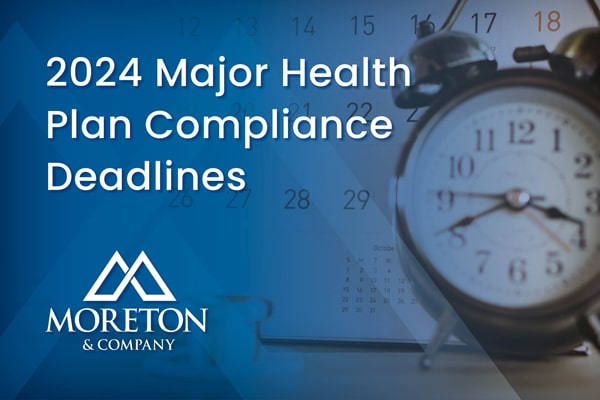
Guidance Released for Group Health Plan
“No Gag Clause” Attestations
The new guidance clarifies that gag clauses include restrictions on the disclosure of provider rates regardless of whether the TPA considers them “proprietary,” or provisions that allow access to provider-specific cost and quality-of-care information only at a TPA’s discretion. In addition, to the provision from late February, the Department of Labor, Treasury ,and Health and Human Services (the “Departments”) released new guidance (via FAQs) implementing the prohibition on “gag clauses” in health plan/ service provider agreements contained in the No Surprises Act. The newly released guidance contains information on how to submit attestations, as well as guidance on what constitutes a “gag clause.”
As background, the No Surprises Act requires health plans to attest annually that the plan does not have agreements with providers, third-party administrators (TPAs) or other services providers that directly or indirectly restrict the plan or issuer from (1) disclosing provider-specific cost or quality-of-care information to the plan sponsor, referring providers, participants, or individuals eligible to participate in the plan, (2) electronically accessing de-identified claims and encounter information (consistent with applicable privacy protections) on a per-claim basis, or (3) sharing the information described in (1) or (2) with a business associate.
Plans must submit their first attestations on December 31, 2023, which will cover the period from December 27, 2020 (or, if later, the effective date of the plan or insurance coverage) through the date of attestation. Subsequent annual attestations will be due every December 31 and must be submitted through a dedicated CMS website.
Self-insured plans may contract with a third-party administrator to submit the attestation on the plan’s behalf; however, the obligation to make a complete and accurate attestation ultimately remains with the plan, not the TPA. For fully-insured plans, while the plan and the issuer are each required to annually submit the attestation, if the issuer submits an attestation on behalf of the fully-insured plan, both will be deemed to have satisfied the attestation requirement. The guidance clarifies that an issuer that offers both group health insurance and acts as a TPA for self-insured plans may submit a single attestation on behalf of itself, its fully-insured group health plan policyholders, and its self-insured health plan clients.
The new guidance clarifies that gag clauses include restrictions on the disclosure of provider rates regardless of whether the TPA considers them “proprietary,” or provisions that allow access to provider-specific cost and quality-of-care information only at a TPA’s discretion. In addition, provisions that indirectly operate to restrict access to or disclosure of applicable information violate the prohibition on gag clauses – even if they don’t expressly restrict disclosure.
While many plan sponsors have already reviewed service agreements to confirm the existence of any gag clauses and made necessary amendments, the new guidance on provisions considered to be “gag clauses” may require an additional review. Plan sponsors will want to coordinate the required reporting with their carriers or TPAs well before the end-of-year deadline.
Most Employers Will Now
be Required to E-file ACA Returns
The IRS has finalized regulations substantially expanding mandatory electronic filing of Affordable Care Act information returns (i.e., Form 1094-C and Forms 1095-C). The new regulations establish lower thresholds for mandatory electronic filing of the following returns affecting employee benefit plans. In particular, for filings after December 31, 2023, the threshold for required electronic filing is ten returns, determined by aggregating most information returns – including ACA filings and Forms W-2. Any corrected return must be filed in the same format (electronic or paper) as the original return to which the correction corresponds. This lower threshold effectively means all employers subject to ACA filing requirements will have to file electronically.
The regulations generally provide that the IRS may grant a waiver from the electronic filing requirement if the filer can demonstrate undue hardship, and may provide exemptions – for example, for religious reasons. Also, electronic filing is not required if the IRS’s systems do not support it.
As expected, these regulations vastly expand the electronic filing requirement, eliminating paper filings for all but the smallest employers. While the lower thresholds do not come as a surprise, those that have been filing on paper now need to move forward with their transition to electronic filing, paying close attention to the aggregation rules and effective dates.
IRS Announces 2024 Increases for
ACA Employer Shared Responsibility Penalties
The IRS has announced 2024 indexing adjustments to the applicable dollar amount used to calculate employer shared responsibility payments under the Affordable Care Act. As background, applicable large employers (ALEs) may be liable for an employer shared responsibility penalty under Code § 4980H(a) if they fail to offer minimum essential coverage to a sufficient number of full-time employees. Alternatively, ALEs may be subject to a Code § 4980H(b) penalty if they offer minimum essential coverage to the required number of full-time employees, but the offered coverage is not affordable or does not provide minimum value. The adjusted penalty amount per full-time employee for failures occurring in the 2024 calendar year will be $2,970 under Code § 4980H(a) (a $90 increase from 2023) and $4,460 under Code § 4980H(b) (a $140 increase from 2023).
As a reminder, the IRS uses Letter 226-J to inform ALEs of their potential liability under Code § 4980H. A response form (Form 14764), generally due within 30 days, is included with Letter 226-J so that an ALE can inform the IRS whether it agrees with the proposed penalty. Employers and their advisors should be on the lookout for this letter so that they are prepared to promptly review and respond.


